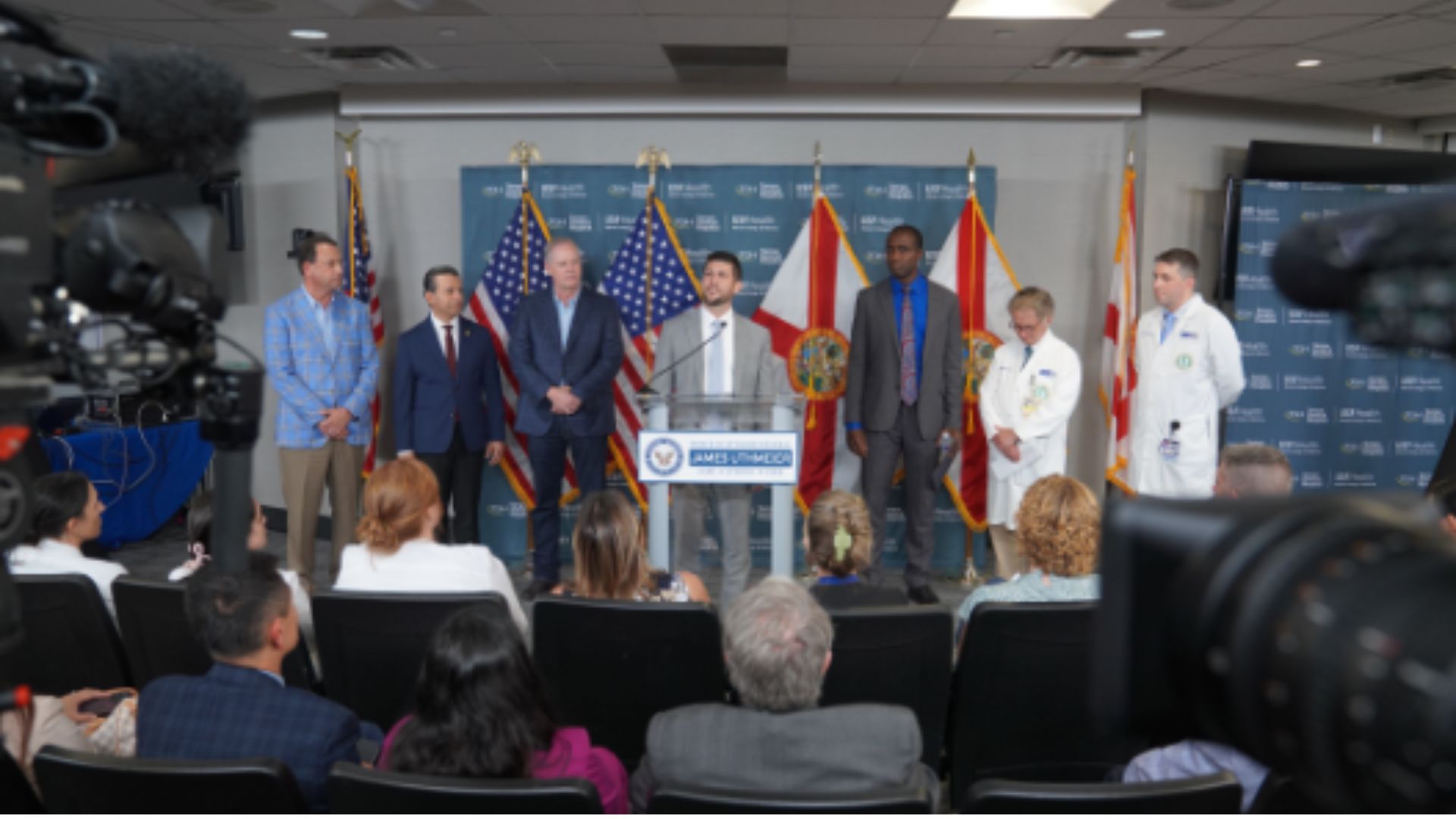South Florida Local News
Florida Attorney General James Uthmeier takes immediate action to remove highly dangerous 7-OH products from store shelves across the state

Tallahassee, Florida – In a decisive move aimed at protecting public health, Florida Attorney General James Uthmeier announced an emergency rule that immediately classifies isolated and concentrated 7-hydroxymitragynine, more commonly known as 7-OH, as a Schedule I controlled substance. The action, effective immediately, makes it illegal to sell, possess, or distribute concentrated forms of the chemical throughout the state, marking a significant step in Florida’s ongoing battle against dangerous synthetic opioids.
“Due to the danger posed to the public, Florida is taking 7-OH off the shelves immediately. This dangerous substance is being marketed to teens and young adults and has a high potential for abuse and death,” Uthmeier said. “We are grateful for President Trump and Dr. Makary for sounding the alarm—giving my office the foundation to protect Floridians.”
The move comes after growing concern over the proliferation of 7-OH in retail outlets, including gas stations, vape shops, and convenience stores, where concentrated forms of the compound are often marketed as natural or wellness products. While kratom—the plant from which 7-OH is derived—has long been used in its raw form, isolated or concentrated 7-OH carries a potency far beyond what is found in whole leaves, creating serious risks of addiction, overdose, and other health crises.
“Concentrated 7-OH products—which are dangerous opioids—snuck into every community in America right under our noses,” said FDA Commissioner Marty Makary, M.D., M.P.H. “I’m glad to see Florida’s state officials fighting back and educating Floridian parents, law enforcement, professionals, teachers, and community leaders about this threat.”
The FDA’s warnings, along with prior alerts from state agencies, set the stage for Uthmeier’s emergency rule. Commissioner Wilton Simpson of the Florida Department of Agriculture and Consumer Services emphasized the importance of this action, noting the previous challenges the state faced in controlling similar substances.
“A few years ago, FDACS raised the alarm on kratom. We were not able to get the support we needed during the Biden years to treat 7-OH as a Schedule I drug, but we were able to prohibit the safe and marketing to Florida’s children,” Simpson said. “This emergency rule by Attorney General Uthmeier is exactly what we need to stop the sale of ‘vape shop morphine.’ Street level drugs hurt families, ruin lives, create victims, destroy our economy, and wreak havoc on our state. Today, we fight back with the force of law through this emergency rule. Today, we make Florida and our families a little safer.”
The classification of 7-OH as a Schedule I substance places it in the same legal category as heroin, LSD, and fentanyl analogs—drugs deemed to have a high potential for abuse and no accepted medical use. This designation gives law enforcement and regulatory agencies the authority to immediately remove the substance from store shelves, ensuring that these highly potent products are no longer accessible to minors and the general public.
State Surgeon General Dr. Joseph Ladapo underscored the threat posed by synthetic opioids derived from kratom, pointing to both public and mental health risks. “Synthetic opioids derived from kratom pose a serious threat to both public and mental health,” he said. “They undermine the intentions of individuals who use kratom safely and the progress we’ve made as a state to reduce overdose deaths.”
Medical experts and healthcare leaders have also weighed in, emphasizing the urgent need for action. Dr. Charles J. Lockwood, executive vice president of USF Health and dean of the USF Health Morsani College of Medicine, praised the coordination between state leaders and federal authorities.
“We are here today because Dr. Marty Makary and the FDA have alerted us to the dangers of 7 OH,” Lockwood said. “By doing so, they have given us an opportunity to save the lives of Floridians and prevent a health crisis. I am deeply grateful to see Attorney General James Uthmeier, Florida Commissioner of Agriculture Wilton Simpson, State Surgeon General Joseph Ladapo, and our other state leaders seizing this moment and working to stop a spiral of deadly overdoses before it begins.”
Emergency medicine specialists, who have witnessed the consequences of exposure firsthand, stress the potency and danger of concentrated 7-OH. Dr. Cory Howard, a board-certified medical toxicologist and associate medical director at Florida Poison Control Tampa, highlighted the compound’s addictive properties and growing prevalence among young Floridians.
“7-OH mitragynine is a dangerous substance not only because of its chemical makeup, high potency and risk of addiction, but also due to the marketing and accessibility of the product. We’ve seen an increase of exposure in Florida, and it is essential that we bring awareness to the grave consequences of this lethal drug,” Howard said. “We are grateful to FDA Commissioner Makary for his leadership in addressing this growing crisis, and we are proud to stand alongside state leaders Attorney General Uthmeier, Commissioner Simpson, and Surgeon General Ladapo as Florida leads the nation to restrict access to this dangerous substance.”
Data from the Florida Department of Health and local health agencies underscores the urgency of the move. Reports indicate a recent surge in emergency room visits and adverse health incidents linked to kratom products, particularly among individuals under the age of 25. These cases often involve concentrated extracts, shots, powders, or capsules that dramatically increase the risk of overdose compared with traditional kratom leaves.
By taking immediate action, Florida joins a growing number of states confronting the challenges posed by synthetic opioids derived from natural plants. Experts note that while whole kratom leaves have been used safely for decades in traditional settings, the concentrated forms of 7-OH available today pose a dramatically different risk profile, particularly for teenagers and young adults who may be drawn to trendy marketing and misleading labels.
The emergency rule also builds on Attorney General Uthmeier’s previous efforts to protect Florida’s youth from harmful substances. Earlier initiatives targeted vaping products marketed to minors, emphasizing the state’s commitment to proactively addressing emerging public health threats before they spiral into crises.
The coordinated approach between federal and state agencies, medical professionals, and law enforcement underscores the seriousness with which Florida is treating this issue. Public education campaigns are expected to follow, aimed at informing parents, teachers, healthcare professionals, and community leaders about the dangers associated with 7-OH products. Authorities are emphasizing that vigilance at the local level is critical to preventing exposure, especially among young people.
For many, the comparison of concentrated 7-OH to heroin and fentanyl is more than symbolic. Unlike traditional kratom, which contains low levels of naturally occurring 7-OH, these concentrated products can trigger rapid onset of opioid effects, respiratory depression, and potentially fatal overdoses. The emergency rule is intended to eliminate these risks by cutting off legal access and enabling law enforcement to take swift action against violators.
“This is not just about restricting a substance; it is about protecting communities, families, and the next generation of Floridians from a preventable health crisis,” said Attorney General Uthmeier. “By acting decisively, we are preventing the escalation of addiction, overdoses, and tragic loss of life before it spreads further.”
With the emergency rule in effect, state authorities are already coordinating with retailers across Florida to remove any remaining stocks of concentrated 7-OH from shelves. Inspections and enforcement actions are expected to continue in the coming weeks, ensuring that the chemical no longer poses a threat to consumers.
The story of 7-OH reflects a broader challenge in public health: the rise of potent, concentrated synthetic derivatives of natural substances marketed in ways that obscure their dangers. Florida’s swift legal response demonstrates a commitment to using the full force of law and public policy to prevent harm and save lives, while also providing a model for other states facing similar threats.
As the state moves forward, the focus will remain on enforcement, education, and prevention. Parents, educators, and healthcare providers are being urged to remain alert to products that may contain isolated or concentrated 7-OH and to report any suspected violations to local authorities. For medical professionals, awareness of the unique risks posed by these substances will be critical in treating patients who may unknowingly ingest dangerously potent opioids.
Florida’s bold move to classify 7-OH as a Schedule I substance, remove it from shelves, and educate the public highlights a proactive and coordinated approach to substance regulation. In the face of a growing national opioid crisis, state leaders are signaling that no chemical—no matter how novel or disguised—will be allowed to threaten public health, particularly that of vulnerable youth.
In summary, Florida’s emergency rule targeting 7-OH is not just a regulatory change; it represents a concerted effort to safeguard lives, prevent addiction, and protect the public from a substance that has slipped under the radar but carries real and immediate danger. Through coordinated action across state agencies, the medical community, and law enforcement, Florida has taken a definitive stand to make its communities safer and to prevent what experts warn could otherwise become a growing epidemic of opioid-related harm.

-

 Community11 months ago
Community11 months agoPompano Beach Pier: A coastal gem in South Florida
-

 Community11 months ago
Community11 months agoPompano Beach cost of living: Housing costs, gas prices, and required income
-

 Community11 months ago
Community11 months agoDiscover the best of Pompano Beach, Florida: A comprehensive guide to the most popular places to visit
-

 Community11 months ago
Community11 months agoMost popular Pompano Beach marinas: Fishing, boating, and a lot of fun time














